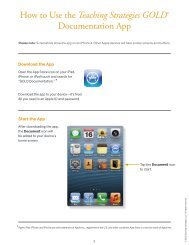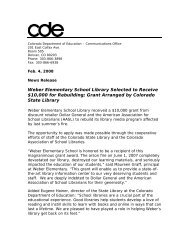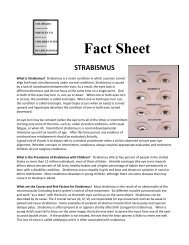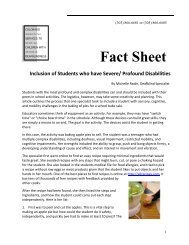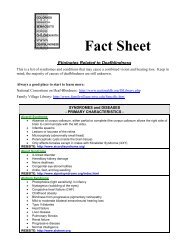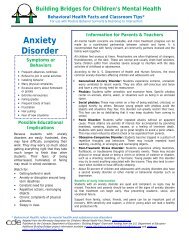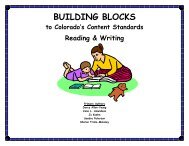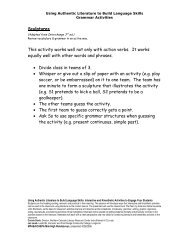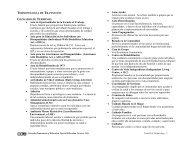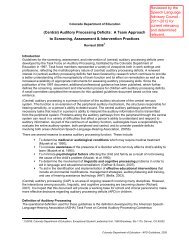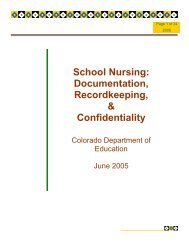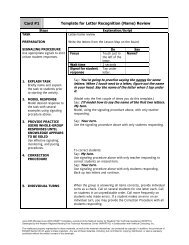ONLINE EDUCATION INTERIM REPORT - Colorado Department of ...
ONLINE EDUCATION INTERIM REPORT - Colorado Department of ...
ONLINE EDUCATION INTERIM REPORT - Colorado Department of ...
Create successful ePaper yourself
Turn your PDF publications into a flip-book with our unique Google optimized e-Paper software.
14<br />
<strong>of</strong> the educational setting, students<br />
with special needs require and are<br />
entitled to appropriate services. The<br />
state, local school districts and other<br />
responsible entities will need to develop<br />
mechanisms to ensure that students<br />
with disabilities have equal access to<br />
alternatives such as online schools,<br />
and that when they enroll appropriate<br />
services are available to them. Meeting<br />
these needs poses signifi cant funding<br />
challenges for online schools.<br />
Facilitating CSAP and ACT Testing<br />
It is essential to facilitate and ensure<br />
statewide testing <strong>of</strong> CSAP and ACT.<br />
Currently, several online schools<br />
combine efforts and staff to provide<br />
suitable testing environments for<br />
students throughout the state. Testing<br />
adds to the coordination complexities<br />
between the online school and the<br />
district <strong>of</strong> residence. It would be<br />
a signifi cant improvement for the<br />
<strong>Colorado</strong> <strong>Department</strong> <strong>of</strong> Education to<br />
coordinate and establish state-authorized<br />
testing centers throughout the state,<br />
and it would be even more desirable<br />
to provide the CSAP as an online<br />
testing option delivered to specifi c<br />
There T was a boy, a little small for his age. He went to a traditional<br />
brick and mortar school, had a diffi cult time completing his work<br />
and keeping his grades up. In spite <strong>of</strong> testing that showed he<br />
was a high-level thinker, this child was picked on by many <strong>of</strong> his<br />
peers, put down by some <strong>of</strong> the staff and teachers, because he<br />
didn’t learn the way everyone else did. He left this school after<br />
a very traumatic incident, leaving him feeling abandoned and<br />
betrayed by the system that was supposed to protect him in his<br />
school environment. He enrolled in Branson School Online and<br />
found support and guidance; he found a system that seemed to<br />
work well for his learning style. Since the fi rst year with our online<br />
school, he has had nothing but A’s and B’s on his report card. His<br />
self-esteem and confi dence levels have soared and he is turning<br />
into a wonderful young man. As a family, we are indebted to the<br />
state <strong>of</strong> <strong>Colorado</strong> that allowed this option to be available to us<br />
when we needed it most.<br />
locations statewide, where the <strong>Colorado</strong><br />
<strong>Department</strong> <strong>of</strong> Education could also<br />
proctor for online students.<br />
4. ACCOUNTABILITY<br />
Accountability is important for all public entities.<br />
In education, accountability instruments and<br />
their application have increased in recent years.<br />
Traditionally, educators have chosen to measure<br />
inputs to achieve “academic progress” rather<br />
than measure results or outputs. But in the last<br />
15 years, public education has been shifting<br />
toward standards-based systems in which schools<br />
are accountable for outputs. Accountability<br />
can refer to the measurement and reporting <strong>of</strong><br />
student academic progress; responsibility for<br />
the use <strong>of</strong> public funds; and compliance with<br />
applicable rules and regulations.<br />
Online education provides a new opportunity<br />
to use output-based performance evaluation<br />
measures. But online education also raises<br />
questions about how to apply existing<br />
accountability systems and what additional<br />
accountability mechanisms are needed. Making<br />
accountability real involves determining at least<br />
three questions: who is accountable; to whom;<br />
and for what?<br />
Online education is subject to all the<br />
accountability provisions covering public<br />
schools, but its delivery system and potential<br />
to serve large numbers <strong>of</strong> students who cross<br />
district boundaries poses some challenges.<br />
Concerns have been expressed about creating<br />
an additional level <strong>of</strong> accountability and an<br />
accompanying bureaucracy. Some argue<br />
that accountability and evaluation indicators<br />
should be applied equally to all schools,<br />
and the challenge for online education is to<br />
appropriately apply existing accountability<br />
measures in innovative settings. This can raise<br />
implementation questions, since accountability<br />
systems were designed for physical schools



